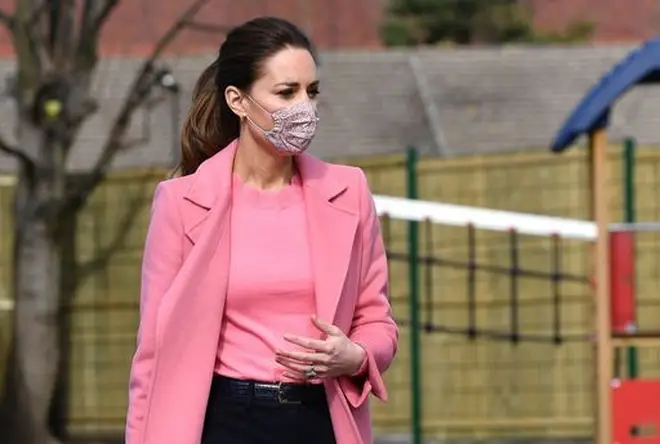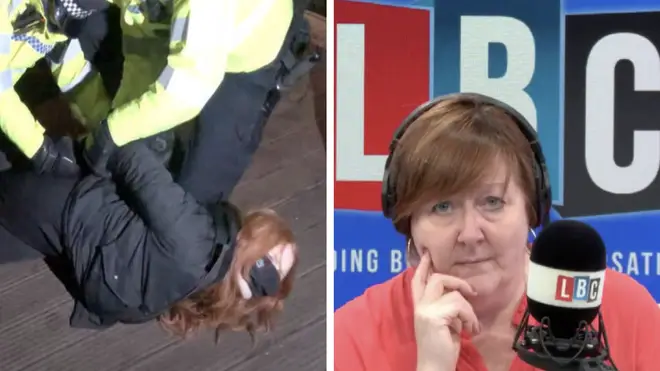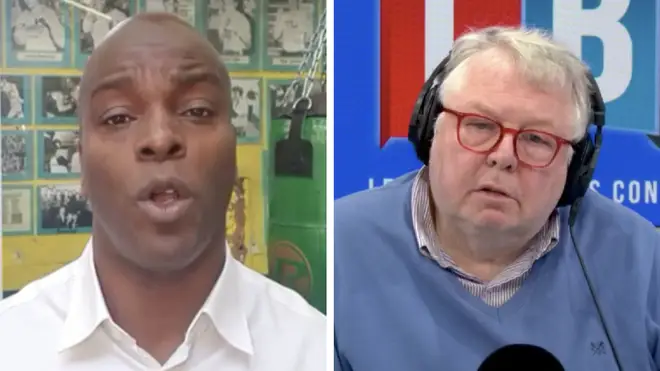
Clare Foges 6pm - 9pm
30 March 2021, 14:40 | Updated: 4 November 2022, 10:15

Duchess of Cambridge pays respects to Sarah Everard at Clapham memorial
A police commander on duty during the vigil for Sarah Everard only learnt of a visit by the Duchess of Cambridge after seeing it reported on the news, a review into the handling of the vigil by the Metropolitan Police states.
Although alongside her protection officers, The Met Police's Silver Commander on duty at the Clapham Common event only realised she visited after seeing it reported by Sky News, illustrating "the absence of effective communication to the Silver Commander about changing events on the ground."
READ MORE: Met Police 'acted appropriately' at Sarah Everard vigil, review finds
The review states: "At about 4.30pm, HRH the Duchess of Cambridge arrived with her protection officers.
"She left flowers at the bandstand before paying her respects and departing without incident. The Silver Commander learnt of her visit only when it was reported by Sky News.
"While we understand that it may be the tactic of protection teams to minimise prewarning of VIPs' movements, this is a matter of concern. The incident illustrates the absence of effective communication to the Silver Commander about changing events on the ground."
Hundreds of people had gathered on March 13 at Clapham Common to pay their respects, including Kate Middleton.
The review by Her Majesty's Inspectorate of Constabulary and Fire & Rescue Services (HMICFRS), led by Sir Thomas Winsor, also found the force was "justified" in taking the view the risks of Covid-19 transmission were "too great to ignore".

READ MORE: Met Police 'acted appropriately' at Sarah Everard vigil, review finds
The review has also found officers "did not act inappropriately or in a heavy-handed manner".
It adds that the Metropolitan Police was "justified in adopting the view that the risks of transmitting COVID-19 at the vigil were too great to ignore when planning for and policing the event."
Sir Thomas, the Chief Inspector of Constabulary, said: "My thoughts are with Sarah Everard's family and friends, who are suffering the most unthinkable pain.
"The commissions I received from the Home Secretary and the Mayor of London to inspect the Metropolitan Police's handling of the vigil for Sarah Everard on Clapham Common have been fulfilled. This has been a rapid but detailed inspection.
"Public confidence in the police is critical. It is therefore important that there has been an independent, objective, evidence-based inspection to provide public reassurance, which we provide today.
"Our civilian police model is precious. Officers are our fellow citizens, invested by the community to keep the community safe. They rely upon and are entitled to receive public support when they act lawfully, sensitively and proportionately; in this case, in the face of severe provocation and in very difficult circumstances, they did just that."

Met Commissioner Cressida Dick had faced calls to resign over the policing of the event, which saw officers break up the commemoration of the 33-year-old marketing executive on March 13.
Matt Parr, Her Majesty's Inspector of Constabulary, who led the inspection team, said condemnation of the Met's actions was "unwarranted".
He said: "Amidst a heightened public debate on women's safety, and during an unprecedented pandemic, the Metropolitan Police faced a complex and sensitive policing challenge at Clapham Common.
"Condemnation of the Met's actions within mere hours of the vigil - including from people in positions of responsibility - was unwarranted, showed a lack of respect for public servants facing a complex situation, and undermined public confidence in policing based on very limited evidence.

"After reviewing a huge body of evidence - rather than a snapshot on social media - we found that there are some things the Met could have done better, but we saw nothing to suggest police officers acted in anything but a measured and proportionate way in challenging circumstances.
"A minute's silence was held for Sarah at 6pm, after which a peaceful and sombre vigil turned into something else - a rally with dense crowds and little or no social distancing.
"We concluded that the Met was right to recognise the need to be seen to be consistent in its policing of all events and gatherings. They were, therefore, right to enforce the regulations - having gone to some lengths to persuade people to disperse."